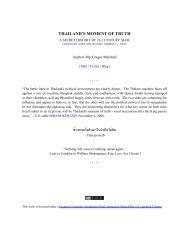THAILAND'S MOMENT OF TRUTH - ZENJOURNALIST
THAILAND'S MOMENT OF TRUTH - ZENJOURNALIST
THAILAND'S MOMENT OF TRUTH - ZENJOURNALIST
Create successful ePaper yourself
Turn your PDF publications into a flip-book with our unique Google optimized e-Paper software.
the country's most powerful men to his feet and, with a few deliberately spoken words, expel<br />
them from politics and end the bloody fighting on the streets of his kingdom. Amid established<br />
institutions of law, a parliament, courts, and influential religious, social and business leaders, only<br />
Bhumibol had the prestige and command required to rise above explosive chaos and restore peace<br />
and unity...<br />
Among his people, King Bhumibol had become a sovereign of unmatched virtue and sagacity,<br />
alone able to resolve the most intractable problems and disputes. For many worldwide he<br />
represented the enduring utility of sovereign monarchy amid the uncertainty of liberal democracy<br />
and capitalism. For some of his Thai subjects he was much more: a bodhisattva, an earthbound<br />
incipient Buddha, like a living deity. [Handley, The King Never Smiles]<br />
- - - - -<br />
By the start of the 21st century, Bhumibol’s moral authority towered over Thailand, far outshining elected<br />
politicians or anybody else in the kingdom. His image was everywhere; writing about Bhumibol in New<br />
York Review of Books in 2007, Ian Buruma described the astonishing ubiquity of Rama IX throughout<br />
the country:<br />
Everywhere you look, especially during the sixtieth anniversary year of his reign, you see His<br />
Majesty's face, on posters and billboards, on the walls of every store and restaurant, in all public<br />
buildings and many private ones, on streamers and banners strung across major thoroughfares,<br />
in hotels, airports, schools, and shopping malls, and at the beginning of every movie screening:<br />
Bhumibol receiving foreign monarchs; Bhumibol visiting the rural areas, a notebook and camera<br />
readily at hand; Bhumibol surveying his kingdom from above the clouds, a golden halo playing<br />
around his bespectacled face; Bhumibol the family man, with Queen Sirikit and their loving<br />
children; Bhumibol the warrior king in uniform; Bhumibol the jazz player, his trumpet to the fore;<br />
Bhumibol the priest-king, in a gold coat, waving a kind of papal blessing; and so on.<br />
A typical Thai description of Bhumibol’s unique role is this passage from By the Light of Your Wisdom:<br />
King Bhumibol Adulyadej, A Wise and Righteous King by Danai Chanchaochai, one of the many books<br />
on sale in Thailand expressing heartfelt reverence for the king:<br />
His Majesty is a constitutional monarch in a democratic country. He appears neither to seek nor<br />
want a political role. But sometimes the government and the people are truly in difficulties and<br />
do not know where to turn. That is when they turn to His Majesty. He is the most respected and<br />
trusted in the land. He is their Lord of Life.<br />
Bhumibol played this role by appearing only to explicitly intervene exceptionally rarely, at times of crisis.<br />
But through his speeches, in which he addressed Thailand’s people - and politicians - in oracular, sagelike<br />
language, he was seen as a moral guardian overseeing the government and ensuring it did not stray<br />
too far from the right path:<br />
The highest moral authority with legitimacy equal to or surpassing that of an elected government




